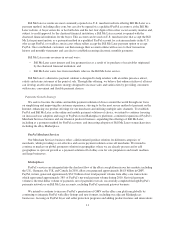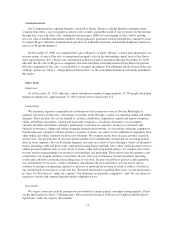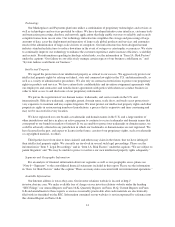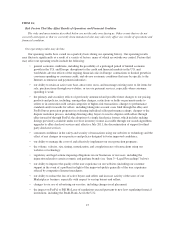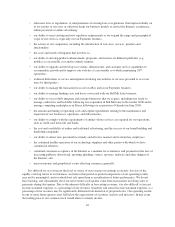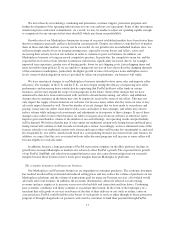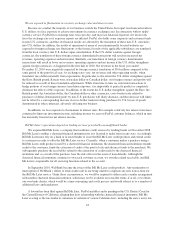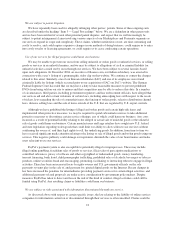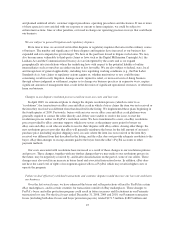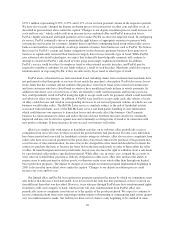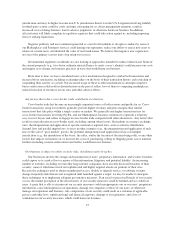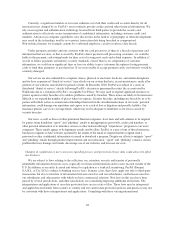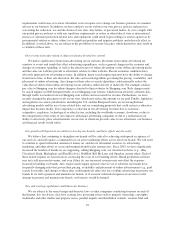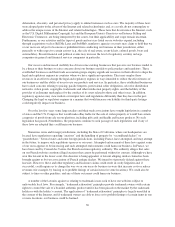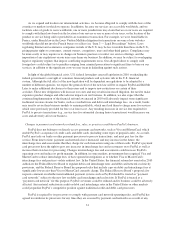eBay 2010 Annual Report Download - page 26
Download and view the complete annual report
Please find page 26 of the 2010 eBay annual report below. You can navigate through the pages in the report by either clicking on the pages listed below, or by using the keyword search tool below to find specific information within the annual report.PayPal Australia’s anti-money laundering compliance policies and procedures and issue a report identifying any
unremediated deficiencies accompanied by a plan by PayPal to remedy any such deficiencies. In the enforceable
undertaking, AUSTRAC expressed concern that PayPal Australia did not have systems and controls in place to
manage adequately its money laundering and terrorist financing risk. In September 2010, the independent auditor
completed its review and issued its report, and PayPal Australia submitted a remediation plan. PayPal Australia is
in the process of investing in improvements to its anti-money laundering and counter-terrorist financing systems,
policies and operations as part of its remediation plan. In addition, PayPal Australia will be required to obtain
additional information from customers, verify that information, and monitor its customers’ activities more
closely. As PayPal continues to localize its services in additional jurisdictions, it could be required to meet
standards similar to those in Australia. These requirements could impose significant costs on PayPal, cause delay
to other planned product improvements, make it more difficult for new customers to join its network and reduce
the attractiveness of its products.
Although there have been no definitive interpretations to date, PayPal has taken actions as though its service
is subject to the Electronic Fund Transfer Act and Regulation E of the U.S. Federal Reserve Board. Under such
regulations, among other things, PayPal is required to provide advance disclosure of changes to its service, to
follow specified error resolution procedures and to reimburse consumers for losses from certain transactions not
authorized by the consumer. PayPal seeks to pass most of these losses on to the relevant merchants, but PayPal
incurs losses if the merchant does not have sufficient funds in its PayPal account. Additionally, even technical
violations of these laws can result in penalties of up to $1,000 for each non-compliant transaction or up to
$500,000 per violation in any class action, and we could also be liable for plaintiffs’ attorneys fees. In the second
quarter of 2010, two putative class-action lawsuits (Devinda Fernando and Vadim Tsigel v. eBay Inc. and
PayPal, Inc.; and Moises Zepeda v. PayPal, Inc.) were filed in the U.S. District Court in the Northern District of
California. These lawsuits contain allegations related to violations of aspects of the Electronic Fund Transfer Act
and Regulation E and violations of a previous settlement agreement related to Regulation E, and/or allege that
PayPal improperly held users’ funds or otherwise improperly limited user’s accounts. These lawsuits seek
damages as well as changes to PayPal’s practices among other remedies. A determination that there have been
violations of the Electronic Fund Transfer Act, Regulation E or violations of other laws relating to PayPal’s
practices could expose PayPal to significant liability. Changes to PayPal’s practices that may result from these
lawsuits could require PayPal to incur significant costs and to expend product resources, which could cause delay
to other planned product improvements, which would further harm our business.
Our Bill Me Later service is similarly subject to a variety of laws and regulations. Although we do not
originate loans under the Bill Me Later service, we do purchase receivables related to the consumer loans
extended by the bank which originates them, and one or more jurisdictions may conclude that the eBay company
which purchases those receivables is a lender or money transmitter or loan broker, which could subject us to
liability or regulation in one or more jurisdictions. As described under the caption “Bill Me Later’s operations
depend on lending services provided by an unaffiliated lender” above, a lawsuit has been filed against Bill Me
Later in the U.S. District Court for the Northern District of California alleging that in its relationship with the
former issuer of the Bill Me Later credit products, Bill Me Later was acting as the true lender to customers in
violation of various California laws, including the state’s usury law.
Additionally, federal regulators could mandate changes to the relationship between us and the issuing bank
of the Bill Me Later credit products. Any termination or interruption of the issuing bank’s lending services to
consumers could result in an interruption of Bill Me Later services, as described under the caption “Bill Me
Later’s operations depend on lending services provided by an unaffiliated lender” above. Also, effective in three
stages in February 2010, July 2010 and August 2010, certain provisions of the Credit Card Accountability
Responsibility and Disclosure Act of 2009, or the CARD Act, and certain changes to Regulation Z of the U.S.
Federal Reserve Board require the issuing bank and us to make fundamental changes to many of the practices
currently used with respect to Bill Me Later consumer accounts, including marketing, pricing (including finance
charges, promotional programs and late fees assessed on receivables purchased by us from the bank) and billing,
which could in turn adversely affect this business.
21


